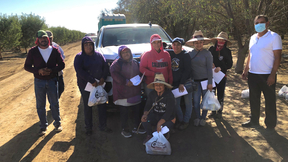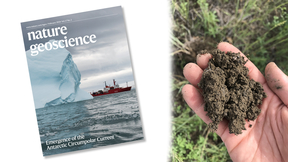DDLS presentation dives into carbon sequestration in ocean depths
Chemical experiments in the deep sea will be discussed in depth when Peter Brewer, senior scientist at the Monterey Bay Aquarium Research Institute, presents the next Director’s Distinguished Lecturer Series. The talk takes place at 3:30 p.m., Monday, March 12, in the Bldg. 123 auditorium.
The initial work of Brewer and his colleagues at the Monterey Bay Aquarium Research Institute focused on the experimental creation and manipulation of methane hydrates in their native oceanic setting at about 800 meters depth. This was soon followed by the extension to hydrates of carbon dioxide and their relation to deep-ocean sequestration of fossil fuel carbon dioxide, with work ranging from 250-3,600m deep.
New results now emerging from joint experiments with the Laboratory and the U.S. Geological Service reveal the quite rapid dissolution rate of hydrates. Brewer will discuss his findings during his presentation.
"Over the last five years we have rapidly advanced the art of carrying out sophisticated chemical experiments in the deep sea," said Brewer. "This has been made possible by the availability of advanced remotely operated vehicles (ROVs) which serve as the carrying platform and provide power, data rates, real time visualization, and robotic manipulative capability undreamed of only a few years ago."
Brewer and his colleagues measured the fate of rising plumes of gas bubbles in real time to examine the consequences of both gas line blowouts, and natural hydrate venting. They carried out the first ever controlled deep-sea measurements to examine the changes in micro-geometry of porous rocks induced by hydrate formation, and they are ready to make in situ laser Raman measurements of a wide variety of oceanic chemical phenomena.
Each of these studies is recorded on videotape and the result is the ability to show graphic and often compelling images of novel science in the deep sea.
Prior to joining the Monterey Research Institute in 1991, Brewer spent 24 years as a researcher at the Woods Hole Oceanographic Institution. He served as program manager for Ocean Chemistry at the National Science Foundation from 1981-83, receiving the NSF Sustained Superior Performance Award. He is a fellow of the American Geophysical Union and of the American Association for the Advancement of Science, and has served on international ocean sciences committees.
Director Bruce Tarter invites all employees to attend. The lecture will be broadcast on Lab Channel 2 Thursday, March 15, at 10 a.m., noon, 2, 4, and 8 p.m., and Friday, March 16, at 4 a.m.
Contact
Public Affairs OfficeTags
Earth and Atmospheric ScienceSequestration
Featured Articles







